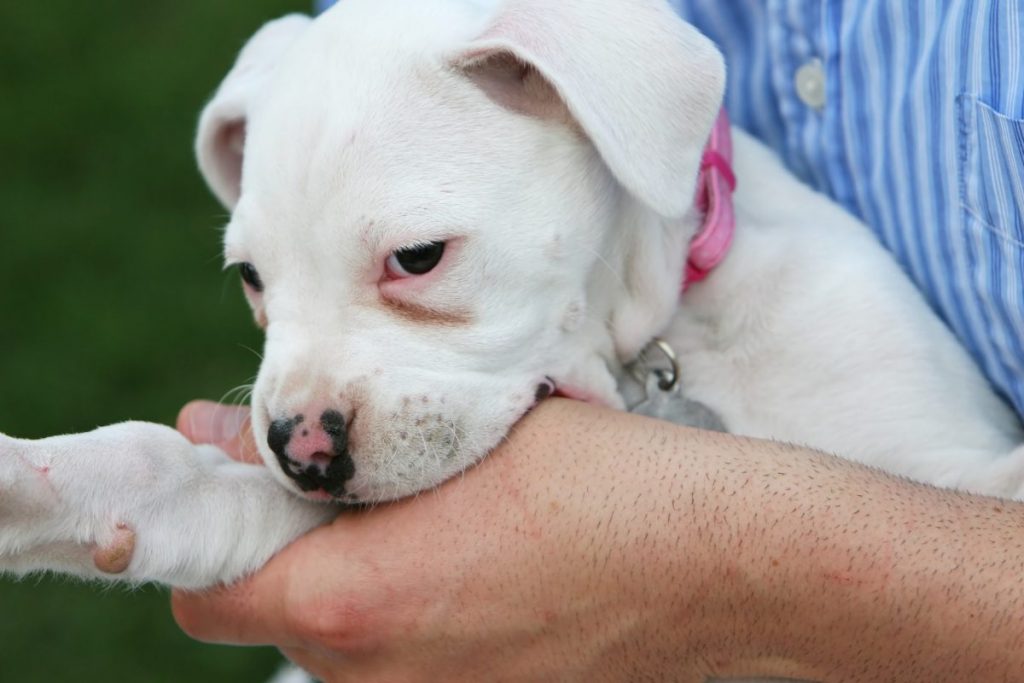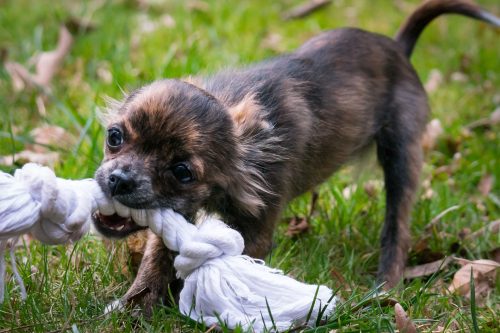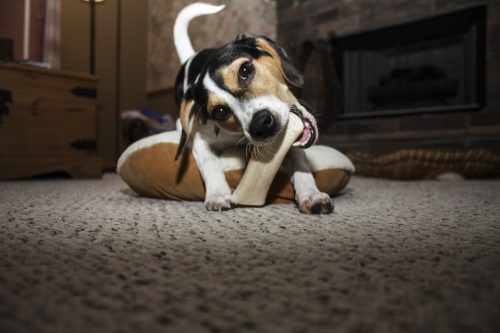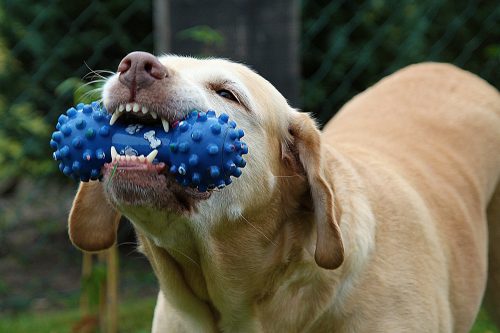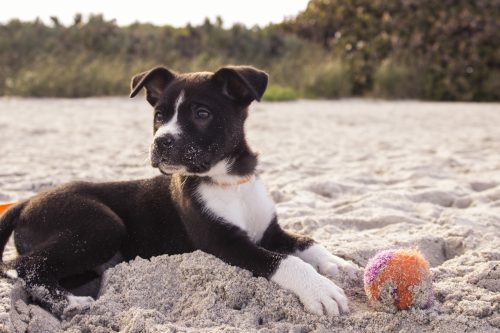As any puppy parent knows, our furry companions love to bite, chew and explore whatever they can – but there comes a time where we need to step in and provide them with proper training so they can develop into well-adjusted adult dogs.
Although biting and mouthing objects and people during play is perfectly normal, it’s essential to curb his behavior at an early age to avoid nipping and biting. It may seem adorable when your pup is nibbling at your hands, clothing or legs when he’s a few weeks old, but as he grows larger, knowing how and when to employ appropriate behavioral modification techniques is a fundamental part of raising a well-behaved pet.
The Formative Years: Teach Your Puppy Well
It’s important to teach your puppy right away that biting is a no-no – even though it may seem cute during play, if we reinforce this behavior at a young age, your pooch may think it’s okay. There are a variety of methods that are effective in teaching this life-lesson.
First and foremost, help your dog understand that people have sensitive skin, so he knows to be gentle when using his mouth – whether it’s receiving food or a treat or playing with your children, biting of any kind should be handled with the utmost precaution.
According to some trainers and canine behavioral therapists, a dog who has been trained to use his mouth gently when interacting with people is less apt to bite hard and/or break skin in the event that he ever bites someone in a situation outside of play (i.e., if he’s scared or in pain).
The terminology known as bite inhibition refers to a dog’s ability to control the force of his mouthing – in other words, knowing how to gauge instinctively what is ‘too hard’ or inappropriate biting. For pups and dogs who haven’t learned this basic principle, they essentially haven’t been taught to recognize the vulnerability of human skin, so when he bites too hard (even in play), the results can obviously be less than desirable.
Social Cues: The Subtleties of Dog Culture
Although it may seem like simple play, our dogs exist in a much more sophisticated realm of socialization than meets the naked eye. Because dogs don’t learn from toys or books as humans do, but from roughhousing – including wrestling, pouncing, and even biting – they gain valuable life-lessons that can only be gained through physical contact.
In turn, these social cues allow them to survive amongst other dogs and humans alike. Through their physical communication, our pets are able to instinctually interact with humans. Therefore, it’s essential for pet owners to take heed and provide the appropriate training when it comes to bite-inhibition, especially during their early years.
How Does My Puppy Learn Bite Inhibition?
An important part of your dog’s socialization actually occurs during play-time with other puppies. It is during this formative early phase of his life that he will learn bite inhibition, as it is natural for pups to nip and bite during their romps. Upon closer observation, you may occasionally see one puppy bite one of his sisters or brothers too hard, in which case the victim may yelp and stop playing with his siblings.
The offending pup may also be caught off-guard momentarily and cease play-time. Eventually, both pups will resume roughhousing – this is a perfect example of how your puppy learns to acclimate and learn socialization skills. By interacting with their litter, puppies learn how to control the strength of their bites so that no one gets seriously hurt, and they can continue playing. Keeping this in mind, puppies are not only capable of learning from one another, but also right from wrong from their pet parents.
Training Your Puppy Not to Bite: Helpful Tips & Suggestions
When you engage in play-time with your furry friend, let him mouth on your hands until he bites too hard. When he does this, immediately let out a high-pitched cry to indicate you’re hurt, and let him see your hand go limp. This behavior typically startles puppies and he should stop mouthing you, at least for the time being.
If yelping or crying out loudly doesn’t faze him, you can let him know that this is undesirable behavior by speaking with him in a stern voice. If he stops biting or licks instead, be sure to praise him – you may even want to reinforce this good behavior with a treat. Continue playing as before, and if he bites again, yelp or talk to him in a stern voice; repeat these steps no more than three times over a 15-minute training session.
In the instance that yelping is ineffective in your training, you may choose to a time-out technique; this lesson has been proven effective for curbing mouthy puppies. When your pup bites hard, be sure to yelp; he’ll most likely be startled, and that’s when you will pull your hand away. You may either ignore him for 10-20 seconds, or if he begins mouthing again, move away from him for another 10-20 seconds.
After this short time-out session, resume play-time. Keep playing with him until he bites again, and repeat the aforementioned technique. Once your pup begins to ease up on the hard biting, you can begin to enforce even stricter rules. Yelp and disengage in play-time in response to moderately hard biting; continue this process and give time-outs for his hardest nips.
Keep using these biting inhibition techniques during play-time until he is capable of playing with your hands gently and learns to control his mouthing so you feel little to no pressure when his teeth contact your skin.
Here are some other helpful tips when curbing your dog from biting and related behavior:
- Throw Him a Bone: Offer your pet a chew toy or puppy-safe bone as a substitute when he attempts to nibble on your toes or fingers.
- Distraction Therapy: Puppies are notorious for nipping when they’re being pet, scratched, or receiving belly-rubs. If your furry friend has a tendency to get overly excited when you show him affection, distract him by giving him little treats from your other hand. This technique will help acclimate your puppy to being touched without mouthing or biting.
- Hands Off: Engage your pooch in non-contact sports and play-time activities (such as playing fetch with a ball and tug-of-war) instead of rough-housing or wresting that involves direct hand contact. Keep a favorite chew-toy in your pocket, so in the event he mouths you during this activity, you can redirect him to his toy. The goal is to train him to look for his toy when he feels the urge to mouth.
- Nip No More: For pups who have a tendency to nip at ankles and feet, carry his favorite chew toy in your pocket. The moment he begins to bite, stop moving your feet, and entice him with the toy. Once he grabs it, start moving again. If he happens to bite you when there is no toy available, freeze in your tracks until the nipping has subsided. The moment he ceases, give him praise and reward him with a toy or treat. Use this technique as long as possible until you have broken him from this habit.
- Keep It Interesting: Be sure to rotate toys and offer plenty of new stimulation to your pup so he’s sure to play with them and not chew on you, your clothing, furniture or other household items.
- Socialization Savvy: It’s a crucial part of your puppy’s development to experience socialization with other puppies, well-behaved vaccinated adult dogs and other people. Pups who play with other young dogs have shown better social skills and are less apt to play roughly with their human family members. You may even wish to sign your furry friend up for puppy class, where he can play under the supervision of an expert while learning valuable new lessons and skills.
- Time Out: For puppies who are excessively mouthy, you may need to use the time-out techniques as described earlier; however, you’ll administer time-outs each time you feel his teeth touch your skin (i.e., not just for hard biting).
- Puppy-Proofing: The moment you feel your pup’s teeth on your skin, give a high-pitched yelp, and then walk away immediately. Ignore him for 30-60 seconds; if he follows you or continues to gnaw or bite, leave the room for another 30-60 seconds. It is important to ensure the room is ‘puppy-proofed’ before you leave your pooch alone – be certain to remove any items he could destroy or that may possibly hurt him). After this time-out session, calmly return to whatever you were doing.
- Quiet Time: When a time-out is called for, you may wish to keep a leash attached to his collar during training and let it drag during supervised sessions. Instead of leaving the room when he mouths you, simply take ahold of his leash and put him in a quiet area of the house, tether him safely, and turn your back for a few moments. Then untie him and resume your normal routine.
- Patience Is a Virtue: Remember, just like babies, puppies are curious creatures, learning the world around them one step at a time – be sure to remain patient, compassionate and understanding with your young dog. Playful mouthing and nipping is perfectly normal for pups and young dogs and is to be expected at this phase of their development.
For many pet owners – especially for first-time puppy parents – mouthing issues can pose a challenge. Therefore, you may wish to seek the assistance of a Certified Professional Dog Trainer (CPDT), who can assist you with group or one-on-one training. Contact CCPDT.org (Certified Council for Professional Dog Trainers) to find a trainer in your area.
Here are some other guidelines to keep in mind when training your puppy not to bite:
- Never wave your fingers or toes in your puppy’s face or slap the sides of his face to engage him in play-time – these actions can actually encourage him to bite.
- Encourage play, don’t avoid it – playing with your dog is essential for his emotional well-being, and helps build a strong bond between you and your pet. The main goal is to teach your puppy to play gently.
- If your puppy mouths your hands and feet, try to avoid sudden jerking motions – this can encourage jumping or grabbing behavior. A better technique: let your feet and hands go limp, as they become less appealing to ‘play’ with from your dog’s perspective.
- Never slap or hit puppies for playful mouthing – it will only make them bite harder, as dogs instinctively react by playing/roughhousing in a more aggressive fashion when mishandled. Any type of physical punishment can create fear and anxiety in your dog and is a form of abuse, with the possibility of creating aggressive dogs which can become a danger to you, your family and others. If you are unsure how to discipline your dog properly, please seek the assistance of a professional dog trainer or other qualified expert.
How to Identify Mouthing As Aggression
As we have previously discussed, mouthing and gentle biting is part of your puppy’s development and is perfectly natural canine behavior. However, if you note your young dog is biting out of anxiety, fear, or frustration, it may signal symptoms of potentially aggressive behavior.
In this instance, it’s important to contact a trained and licensed professional to decipher your dog’s behaviors and determine a course of treatment. Your veterinarian should be able to direct you to an appropriate expert, or you can locate a Certified Applied Animal Behaviorist (CAAB) or a Diplomate of the American College of Veterinary Behavior (Dip ACVB).
In the instance that you can’t find a behaviorist in your region, a CPDT can assist you; however, be sure that he or she has professional credentials and experience treating dogs with aggression and fear diagnoses. With the proper training, you can help your dog overcome aggression and provide him with the socialization skills needed for a fulfilling and happy life.

